Fractional or shared ownership could see you spending money like the owner of Chelsea Football Club billionaire Roman Abramovich. Well that might be an exaggeration but it is true that your spending power can increase dramatically. Fancy owning a luxury holiday property or a race horse or a yacht.
Shared (fractional) ownership could be the answer says Neil Robertson of Reachtogether.co.uk.
So What Is It?
Shared or fractional ownership, not to be confused with timeshare, is where a number of people contribute funds to buy a leisure asset (e.g. house or yacht) and share the use of it. Crucially you also own a proportion of the asset, which is where it differs from timeshare. If the value of the asset increases then (in theory) the value of your share increases too. Contrast this with timeshare, where you only “own” the right to use the asset for the specified period of time each year.
Example
A group of people who are interested in buying a property in Mallorca, total cost £250,000, decide to buy it together. They each buy a 10th share for £25,000 which entitles them to 5 weeks use each year. The allocation of weeks is handled by season, with each group member choosing 1 week from high season, 2 weeks from mid-season, and 2 weeks from low season. The order in which they choose their weeks is initially chosen by lottery, and rotates thereafter. After a fixed period of 5 years the property is sold and the value returned to the share owners. Each share owner will pay a 10th of the maintenance fees. The time allocation and maintenance will be handled by a management company.
Lower share sizes are possible, e.g. 50th shares which in the above example would give 1 week each year. Share sizes lower than 50th would entitle the share owner to entry into a lottery to determine whether they were entitled to a week in a year. Both of these options give a low-cost way to enjoy ownership, with the possibility of increasing your share size over time.
Benefits
Lower purchase cost is the major advantage. Alternatively if you have a lot of money to spend you could purchase something of much higher value than you would otherwise be able to! As maintenance will typically be taken care of via a management contract you will be free to simply enjoy the property, rather than worrying about looking after it. Of course you will only pay a proportion of the maintenance fees which makes sense, since most owners only actually use their property for 4-10 weeks of the year!
Possible Problems
Conflict with other group members over issues such as change-over times, damage, and time allocation are probably the most likely problems. These can be overcome by the use of a proper contract and management company. Also look out for high management charges, and the options available for selling your share.
More research can be undertaken at the following shared ownership web sites
Reachtogether.co.uk is a community dedicated to the promotion of shared ownership (of almost anything!). You can browse the current shared ownership schemes and/or suggest your own. Particular features of the schemes currently listed are the provision of specified end dates for the groups (usually 3-5 years), the low share values (from £100), and the option for the schemes to be self-managed (cutting out management fees).
www.bestpentic.com A two-bed, two-bathroom apartment at Sugar Hill, near Mullins Beach, in Barbados. A 10-week fraction costs £95,000, with a management fee of £3,751 pa; the estimated rental return is £4,405. Best Group, 0845 652 0771
Pezula.com Twenty-one days a year in one of 10 4,300sq ft beachfront houses at Pezula Private Island & Residence Club in the Seychelles costs £145,000 plus £3,000 pa service charge. Pezula Group, 00 27 443 025 332
Seeff.com Four weeks a year, in two rotating two-week slots, in a five-bed house at Zimbali near Durban, South Africa, costs from £27,000 to £33,000 (depending on sea view), plus £500 pa service charges. Seeff Properties, 00 27 113 173 840
Millionaire property for sale A selection of millionaire property from around the world.



